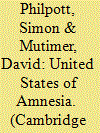| Srl | Item |
| 1 |
ID:
089479


|
|
|
|
|
| Publication |
2009.
|
| Summary/Abstract |
In April 2004 photographs were publicized showing American servicewomen conspicuous among the tormentors of inmates at Abu Ghraib prison. These sadistic images defied gendered expectations about the proper behaviour of women and prompted a flurry of articles on women's involvement. Many responses to the Abu Ghraib disclosures implicitly accepted that such brutality is typical of military men but when enacted by women is aberrant in ways that merit special notice and explanation. Feminist writers tended to construe the photographs as either demonstrating women's equal capacity for conscienceless violence or as confirming women's subordination in the male-dominated military. This paper reconsiders the role of servicewomen in the Abu Ghraib abuses and critiques these foremost feminist readings (which are shown to mirror anti-feminist responses in significant respects). Commentaries on the role of military women neglect the opposition of prominent members of the US armed forces to policies that encouraged abuses. Recognizing the tension between US administration policies and military dispositions sheds a different light on the events at Abu Ghraib, women's involvement in these abuses, and the presumed normalcy of male violence.
|
|
|
|
|
|
|
|
|
|
|
|
|
|
|
|
| 2 |
ID:
089477


|
|
|
|
|
| Publication |
2009.
|
| Summary/Abstract |
Canadian women have been at the forefront of the international movement for women's rights in Afghanistan since the rise of the Taliban in the late 1990s. Focusing on the prominent group Canadian Women for Women in Afghanistan (CW4WAfghan), this paper looks at the role its advocacy assumes in the context of the 'War on Terror'. In Canada, as in the United States, government agencies have justified the military invasion of Afghanistan by revitalizing the oppressed Muslim woman as a medium through which narratives of East versus West are performed. While CW4WAfghan attempts to challenge dominant narratives of Afghan women, it ultimately reinforces the Orientalist logic on which the War on Terror operates. Drawing on Chandra Talpade Mohanty's study of feminist pedagogy, this paper explores the implications of CW4WAfghan's discourse and its dissemination through the Canadian school system. It highlights how CW4WAfghan's portrayal of Canadian values and responsibilities is at odds with feminist efforts to reconceptualize the gendered nature of war and national identity.
|
|
|
|
|
|
|
|
|
|
|
|
|
|
|
|
| 3 |
ID:
089480


|
|
|
|
|
| Publication |
2009.
|
| Summary/Abstract |
Political scientists have long compared war to duelling in the hope that war could be abolished like duelling, that is, at the hands of a normative campaign. However, there has been limited investigation of duelling's past. What can the history of duelling teach us about the future of war? This paper advances two arguments. First, by refining the conventional wisdom, it argues that duelling's demise was caused less by normative campaigning than by the timing of industrialization. Second, it argues that although duelling is not an analogous institution to modern war, its ancestor, feuding, is. Writings on feuds contribute a complementary literature to the limited data on war, which is helpful for thought experiments and hypothesis testing. Further, feuding's fall was caused more by the growth of state capacity than by normative campaigning. In sum, neither the history of duelling nor that of feuding confirms the view that ideational factors played the principal role in suppressing these practices; therefore, we should reconsider how the abolition of war might occur.
|
|
|
|
|
|
|
|
|
|
|
|
|
|
|
|
| 4 |
ID:
089478


|
|
|
|
|
| Publication |
2009.
|
| Summary/Abstract |
This paper presents women's militant activities outside the binary framework of 'victimhood' and 'agency' and invokes postmodern feminist international relations analyses to engage with women's material and ideological contribution to militant activities and political violence. Women who support and indulge in both discriminate and indiscriminate violence against institutions of the state and unarmed civilians not only redefine notions of nationalism, gender and religious identity, but also highlight their complex and problematic relationship with feminism. To what extent does participating in militant activities and armed combat provide women with opportunities to transcend conventional gender roles? In other words, do they remain the 'other' within 'the other'? How are militant women influenced by these political movements and how do they influence these movements? What happens when the 'protected' and 'upheld' become the 'protectors' and 'upholders'? How does/should feminist international relations approach these militant women? I attempt to address these questions through a study of women militants and their constructions as gendered political subjects in Kashmir and Sri Lanka.
|
|
|
|
|
|
|
|
|
|
|
|
|
|
|
|
| 5 |
ID:
089481


|
|
|
|
|
| Publication |
2009.
|
| Summary/Abstract |
This article interrogates the ways in which the United States 'forgets' the consequences and effects of its foreign policy in the making of its identity. In particular, the article argues that such forgetting enables the United States government to frame its interventions in world affairs as innocent and morally driven. Literature on collective memory and the forgetting that enables the production of such memory informs one element of the argument. Three contemporary films from the amnesia genre are analysed to provide insights into the kind of American identity forged in the acts of remembering and forgetting, illustrating the argument that remembering and forgetting are complex, voluntary and at times mendacious processes. The article concludes with the observation that the processes of forgetting past action when framing the context of new interventions make the United States a dangerous force in global affairs.
|
|
|
|
|
|
|
|
|
|
|
|
|
|
|
|